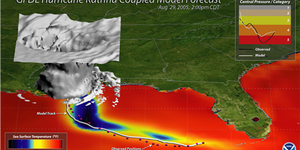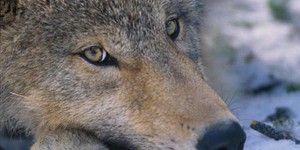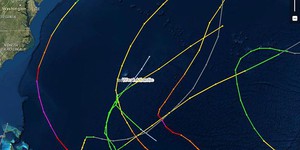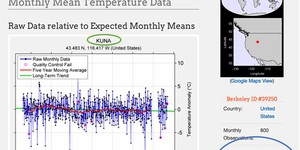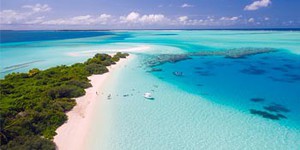Others Like “Track the Journey of Harbor Porpoises” (top 20 results)
|
If you've ever so much as watched a news clip about a hurricane, you probably know that hurricanes draw their power from warm ocean waters. If that is true, does it mean that hurricanes actually cool the ocean down when they pass through? Can the amount of cooling be measured? Is it proportional to the strength of the hurricane? Find out using data that you can collect yourself using online archives. This project shows you how.
Read more
The Sun is the ultimate source of the energy that powers weather systems on Earth. Geomagnetic storms are sun-powered storms in the upper atmosphere, arising from energized particles that are periodically ejected by the Sun. Among other effects, geomagnetic storms can wreak havoc with earth-orbiting satellites, and disrupt satellite communications. The global positioning system (GPS) is a network of 24 earth-orbiting satellites that constantly sends radio signals through the earth's…
Read more
As you move up or down in altitude or elevation, the temperature and pressure will change. This is particularly striking if you live near a mountain range. During the summer, at low altitudes you may have temperatures in the 80's or 90's and still be able to see snow on mountain peaks at high altitude. You can test the effect of altitude by comparing temperature data from weather stations at high and low altitudes. You can test the effect of elevation by making your own weather balloon and…
Read more
Floods can be very destructive, capable of leveling whole towns and decimating crops and fields. Typically in regions prone to flooding there are cycles of flooding that occur, usually in areas where a wet season comes after a period of drought. You can use precipitation data to test if incidents of flooding have been preceded by periods of drought. Look for long periods of dryness in the precipitation data to indicate a drought. You can also conduct an experiment on dry or moist soil to see…
Read more
If you were leaving home for a long walk, how far would you go? One mile, 5 miles, 10 miles? How about 550 miles?! That's a long way, but some wolves have been known to travel that far when they are leaving their packs in search of a mate so they can form their own pack. But is that how far wolves normally travel? Try this wild wolf tracking science fair project to find out!
Read more
You can study hazards that affect coastal areas. What geological forces cause a tsunami? A tsunami (Japanese for 'harbor wave') is a wave generated by an undersea earthquake, landslip, or volcanic eruption. You can demonstrate what causes a tsunami by simulating an undersea earthquake with a water table. How does the depth of water effect the height of the wave? Do different slopes of bottom change the speed of the wave? Visit the USGS Coastal and Marine Geology Program to find out about…
Read more
The past few years have histories of extremely powerful and dangerous storms. Storms have also become more numerous over the last few years. To investigate potential effects of climate on hurricane number and strength, in this project you will study the effects of El Niño on hurricanes. The goal of this project is to study the historic relationship between the El Niño/Southern Oscillation (ENSO) and the number and strength of hurricanes, either in the Atlantic or Pacific Oceans. Since…
Read more
Why do birds migrate? Do all birds have the same reasons for migrating? Where do they go when they migrate? These are questions scientists have asked for centuries. The more species for which they gather data, the more specific the answers become. In this science project, you will choose a species to investigate, then access and evaluate real data collected by scientists to start answering those questions yourself!
Read more
Many continents contain large mountain ranges that divide the continent into different regions. In the U.S. the Rocky Mountains mark the continental divide. The presence of a large mountain range can have a big effect on seasonal weather patterns. Also, the weather and climate on one side of a mountain range may be very different from weather and climate on the other side of the range. In the case of the Rocky Mountains, the western slope and eastern slope each have very different climates…
Read more
When you go to the beach, you may not know if the beach is natural or man-made. The popularity of sandy beaches prompted developers in the past to bring in sand to cover rocky shorelines and turn them into more popular sandy beaches. However, the actions of the tides, currents and waves carried the extra sand out into the reef, endangering the reef and the creatures living on it. You can use a water table to conduct experiments with sand movements and reefs. How is sand moved by water? How…
Read more
|
Explore Our Science Videos
How Strong Is Your Hair? – STEM Activity
Make a Self-Starting Siphon
Making Ice Cream with Science


